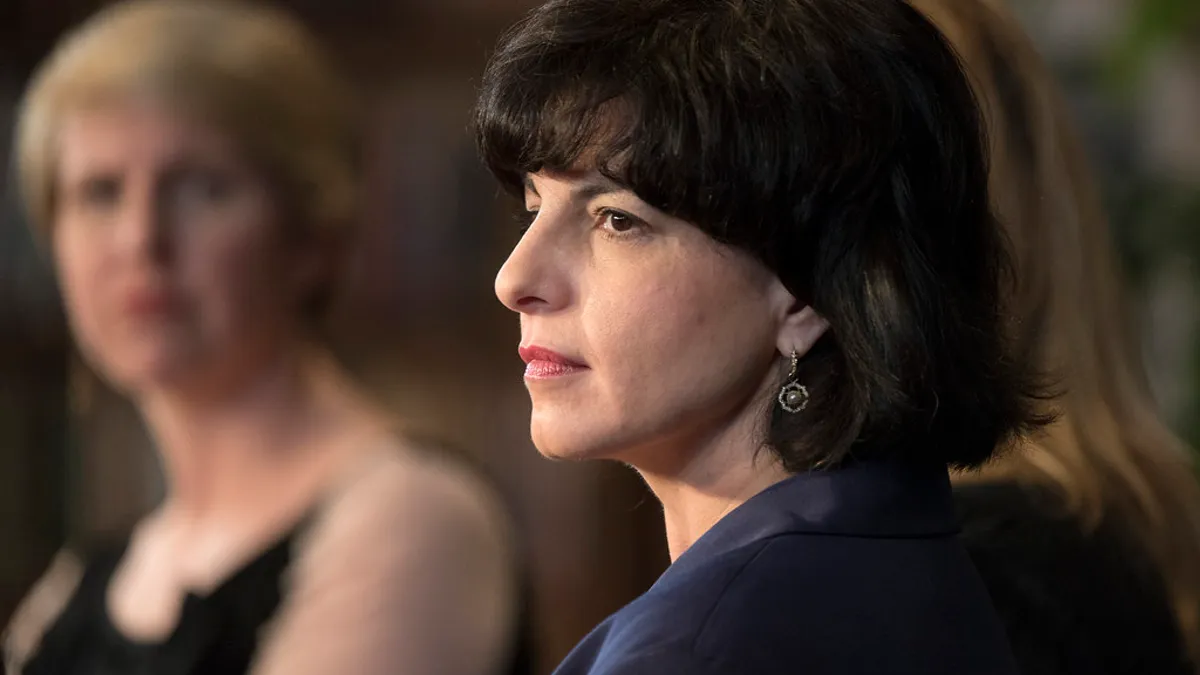Dive Brief:
-
Texas' oil and gas regulator largely shirked responsibility for the outages that plagued the state in February, insisting that the gas industry was not the cause.
-
"I believe that my industry resolved the problem and didn't really create it," said Christi Craddick, one of three commissioners on the Texas Railroad Commission (RRC), which oversees gas utilities, pipelines and the oil and gas industry broadly, among other things. Her comments, during a House hearing investigating the outages, follow assertions from the electric power industry that many of the problems leading to the multi-day blackouts were caused by constraints in the gas supply.
-
Some lawmakers, in questioning Craddick on Friday, seemed to agree the RRC had minimal responsibility in the outages, while others felt the issues were more of a "chicken and egg conundrum," and felt responsibility needed to be shared.
Dive Insight:
Gas plants were the largest contributors to the February outages that lasted for days across the Electric Reliability Council of Texas' (ERCOT) footprint. Of the 52,277 MW of power that tripped offline at peak, around 26,000 MW were gas, according to the grid operator.
Generators during their legislative hearing on Thursday were willing to share the responsibility with the supply-side of the gas industry, and said the primary issue was that of coordination between electric and gas supply entities.
"This was certainly, to some extent, the performance of generators," Vistra CEO Curtis Morgan told lawmakers Thursday. "But the big story here ... was the failure of the gas system to perform." Some generators tripped offline because of frozen equipment on the plants themselves, he said, but there were also issues in getting fuel transported to the plant. Everything from the well heads, to the pipelines, to the plants was underperforming, and supply constraints were a major part of that story, he said.
Craddick, however, said the problem started with electricity — a lot of newer gas compressors are electric and so couldn't operate once the power went down. It wasn't until power was restored to their facilities that they could get the supply chain going again, she said. Communications issues could have been improved to, for example, get the gas facilities higher on the list of entities that shouldn't be turned off in the event of rolling outages, she acknowledged. But she bristled at the idea of adding more regulation to the industry to ensure better weatherization or preparedness.
"We got us out of the problem, to be honest, and kept us online as much as possible," she said.
Some lawmakers agreed with her broadly that the majority of the blame should lie with ERCOT and the Public Utilities Commission of Texas (PUCT), with one even suggesting that the two electricity bodies be moved under the RRC.
"I can't help but think that if the Public Utility Commission and the responsibilities that they have and the responsibilities that ERCOT has were sitting at the Railroad Commission under your responsibility … things would have gone better," said Rep. Raymond Richard Pena, D.
But others were more critical and called on her and her industry to acknowledge areas where they fell short, and who said more regulation should not be off the table.
"I would challenge you to say that you didn't plan properly," said Rep. Eddie Lucio III, D. "When you say, ‘We did our job,' you may have done your job once the problem presented itself, but there were some things that should have been done ahead of time. … Ultimately your agency's accountable."
The RRC is an elected board of three commissioners, so has arguably more accountability to Texans than the governor-appointed PUCT, he said. "Ultimately, the accountability ends with you and with your board. So to say, ‘Well, you know, mandating it is a problem because one size doesn't fit all,' I think that that would be a tough thing to sell to Texans right now."
Other observers agree the RRC could have done more to winterize or otherwise better prepare for cold weather events, and said that despite ample warnings, regulators and their industry ultimately failed to prepare.
"It's pretty shocking to watch an elected official take no responsibility for a crisis, even when directly asked," said Kelly Mitchell, a senior analyst at corporate interest investigation group Documented, in an email.
Although it's "possibly true that we don't have enough data to know exactly why the supply side failed. [And] it might be true that the oilfields need power even under the best winterization plans," there was a lot the RRC could have done to prepare, she said.
Just 29% of production declines were linked to electricity outages in 2011, for example, meaning it is unlikely that outages were the sole cause of supply-side issues this time around, said Mitchell. And federal regulators have long warned of communication issues between gas and electricity. In a 2014 Federal Energy Regulatory Commission and North American Electric Reliability Corp. report on the polar vortex of that year, regulators found "one of the largest issues" that impacted gas-fired generation was "the curtailment or interruption of fuel supply."
"RRC should have had enough data in hand to know that they needed to secure some mix of (1) producer weatherization (2) better [communications] between RRC/[ERCOT]/PUCT [and] (3) a clearer sense of how contracts might interrupt gas supply to plants," said Mitchell. "I don't believe any such thing happened."















